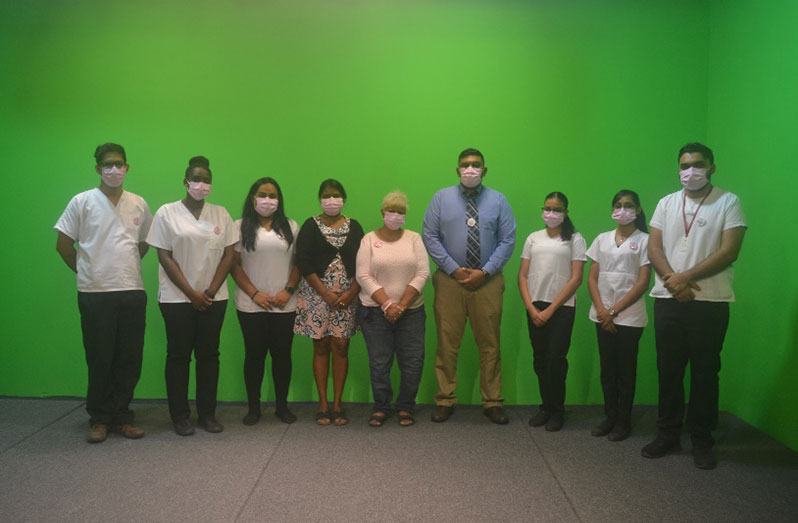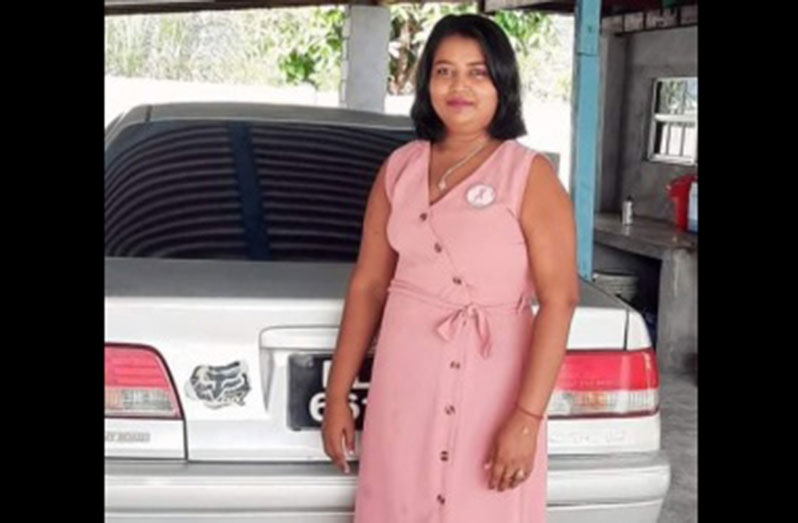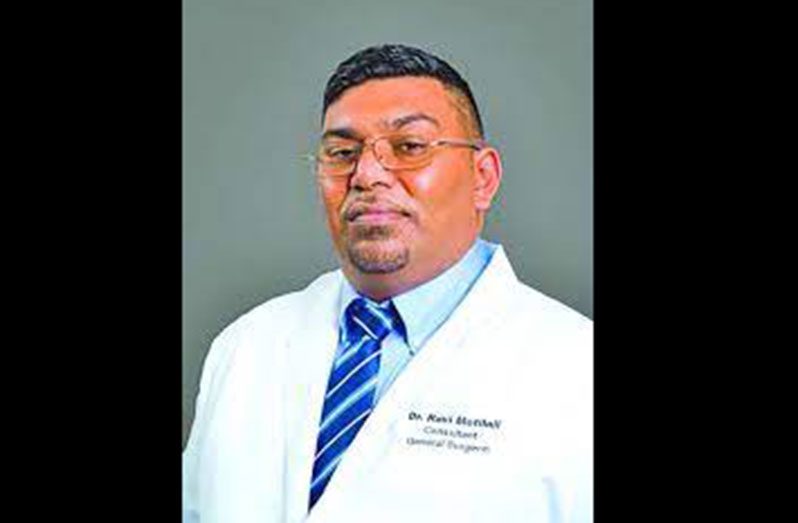EVEN as the American Cancer Association recommends a person to get screened at age 45, it has been found here in Guyana that persons, especially women, are presented with breast cancer at an early age.
This was one of the findings of the 2021 fifth- year medical students of the University of Guyana who undertook an extensive research on the subject as part of their community field-assessment course before graduating in January 2022.
Scanning through 1,897 different sources of information was by no means easy, but having settled on the 24 credible ones that they wanted to use, the team shared its findings.
“Most societies who recommend getting screened for breast cancer before age 40 years would have to take into account some of the risk factors that put you at a higher risk of developing cancer. Here in Guyana, there are a number of women who are presenting with breast cancer at an early age,” the group quoted Dr. Ravi Motilall, Consultant in General Surgery, as saying.

The team of six medical students – Munesh Chowbay, Yogeeta Ghansam, Keisha Gordon, Shareeza Haniff, Kimberly Jaikarran, and Bernard Mc David – was based at the Georgetown Public Hospital Corporation and took weeks to conduct the systematic review.
The National Cancer Institute defines cancer as, “A disease in which some of the body’s cells grow uncontrollably and spread to other parts of the body.” Normally, human cells grow and multiply to form new cells as the body needs them. When these cells become old or damaged, they die and new cells replace them.
“Sometimes, this orderly process is disrupted and results in a disorganised growth and proliferation of the abnormal or damaged cells. These cells then form an abnormal mass of tissues, also known as a tumour. These tumours can be malignant (cancerous) or benign (non-cancerous). Breast cancer is a disease in which cells in the breast proliferate uncontrollably. This uncontrolled growth of epithelial cells originates in the ducts or lobules of the glandular breast tissues,” the report from the team explained.

According to the World Health Organization (WHO), breast cancer is the world’s most prevalent cancer with 1 in 8 women being affected. In 2020, there were 2.3 million women diagnosed with breast cancer, with 685,000 deaths. In Guyana and the Caribbean, breast cancer has been found to be the leading cause of cancer-related deaths among women.
The report pointed out that some factors which increase a person’s risk of developing breast cancer are increased exposure to endogenous estrogen, exogenous estrogen intake, hereditary risk factors and smoking.
“The dangers of cigarette smoking arise from the carcinogenic (cancer-causing) materials in tobacco. These carcinogens travel in the bloodstream and result in the production of damaged DNA material, which inhibits cellular repair, allowing for replication of mutations. Healthy cells become damaged and proliferate out of control. Therefore, no amount of smoking is safe,” the report said.
Alcohol was cited as another risk factor. “Excessive drinking is defined as more than four drinks for women and more than five drinks for men in a two-to-three-hour period. Alcohol causes an increased rate of transformation of testosterone or a decreased rate of metabolism of estrogen, resulting in high levels of estrogen in the body. Some breast cancer cells receive signals from estrogen to grow. Therefore, high levels of estrogen over time promote the progression of breast cancer.”
As with most diseases, diet also plays an important role in the development and outcome of breast cancer. “It is important that our diets contain a variety of fruits and vegetables, grains, proteins to support the body’s needs.
In addition, to healthy foods, at least two to three litres of water per day is recommended. Foods high in fat should be eaten in moderation or avoided, while cooking methods such as baking, broiling and steaming are preferred. Canned, preserved and overly processed foods, which have high levels of artificial additives, should be avoided.”
Regular exercise is extremely important since it can lower the risk of breast cancer development and recurrence, the report continued. Exercise also helps to maintain a healthy weight, boosts energy levels, benefits mental health and overall well-being and reduces side effects from breast cancer treatment. The recommended amount of exercise is at least 30 mins per day for at least three days a week.
Regarding clinical features, the report explained that in its early stages, breast cancer may be asymptomatic, but as the cancer grows changes can occur in both men and women. These changes include a lump in one or both breasts (most common), lumps under the armpits, a change in the size or shape of the breast, skin changes such as dimpling (or indentations), redness, an unusual rash, scaling or ulceration on the breast. Additionally, the nipple is inverted and may discharge blood.
“Clinical and self-breast exams are very important to do at least once a year… which would include a clinical breast examination and a mammogram,” Dr. Motilall commented. “If this is diagnosed early, the chances of survival are best. Late stages, not so great,” he continued. If breast cancer is found early, there is breast-conservation surgery to remove the cancerous lesion. Usually, patients with breast cancer are also placed on chemotherapy and hormone receptor therapy.
The team interviewed Mrs. Alicia Sugrim as part of their research. Mrs Sugrim first noticed a lump, but saw no other signs or symptoms. She is advising women who may be going through a similar situation to prioritise their health and have regular checkups.
According to the team, there is a free screening programme being done at Dr. Balwant Singh’s Hospital where there is mammogram and sonogram-testing being carried out from donations. “If you would like to contact Ms. Bibi Hassan, the head of the Guyana Cancer Foundation…you may contact her directly on telephone number 618 2085. There is also a breast cancer survivor club which you can join. So anyone with cancer or a history of cancer can always reach out to her and join the club,” the group noted.




.png)









